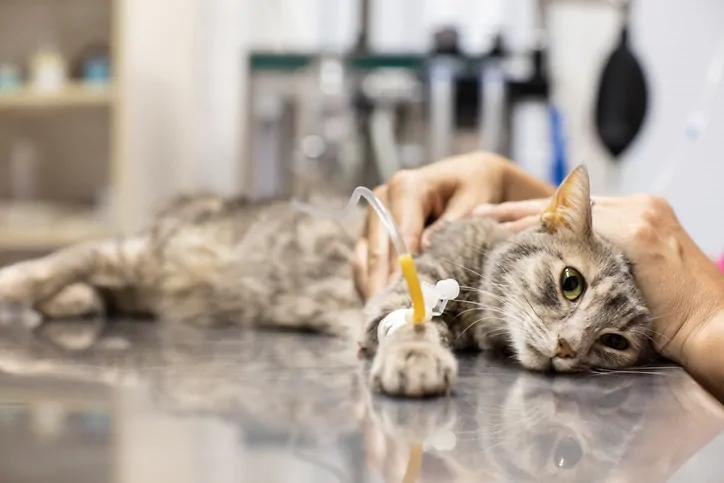Giardia is a microscopic parasite present in tainted food, drink, and surfaces which causes gastrointestinal conditions.
The giardia strains that affect dogs and cats are not typically the same strains that affect humans, therefore, the chances of catching giardia from your pet are slim.
Giardia is most commonly transmitted through contaminated water, soil, and feces.
Giardiasis causes gastrointestinal symptoms that include gas, bloating, diarrhea, nausea, and vomiting.
Giardiasis can be treated with several prescription medications, and, in extreme cases, two medications may be combined for more effective treatment.
Giardia is a microscopic parasite that is present in tainted food, drink and soil, as well as on surfaces contaminated with infected human or animal feces. It causes giardiasis, a diarrheal disease characterized by common gastrointestinal symptoms. Pet feces can carry giardia bacteria even when the animals appear healthy. Giardia bacteria are also common in domestic animals such as cows and goats.
The giardia strains that affect dogs and cats are not the same strains that affect humans, so, the chances of catching giardia from your pet are slim. Even so, giardia is contagious as it can pass from person to person with ease. However, if you have exotic animals, ask your veterinarian if your pet is susceptible to zoonotic giardia. Zoonotic giardia is any strain of giardia that can spread between humans and animals and is prevalent in chinchillas, beavers, opossums, monkeys, and birds as well as goats, cows, and other domesticated animals.

Giardia infections can cause a range of gastrointestinal symptoms in humans, pets, and other animals, but it is possible to exhibit no signs of illness. Common giardia symptoms include:
Untreated giardiasis can evolve into a chronic gastrointestinal illness or result in dehydration, malnutrition, poor overall health, and even death.
According to a 2006 study by the College of Veterinary Medicine and Cornell University (and other collaborators), the average prevalence of giardia infection in pets nationwide was 15.85% for dogs and 10.37% in cats. Cats and dogs in the Northeastern U.S. had the highest prevalence rates while cats and dogs in the Southeast had the lowest. The study represented populations that were owned and well-cared for. Sheltered and feral populations are assumed to have higher prevalence rates, and puppies and kittens are more susceptible to complications from giardiasis than adult dogs and cats. Giardia is transmitted to cats and dogs in several ways including:
Giardia is present worldwide and has been included in the WHO's Neglected Disease Initiative. Human giardiasis infection is most prevalent in under-developed countries with poor water treatment and sanitary conditions at rates as high as 20-40% of the population with the highest incidence among children under 5 years of age. In developed countries, giardiasis rates range between 2% and 7%. Humans may also contract giardia from contaminated water sources as well as from poor hygiene while handling food, changing infected baby diapers, and close personal contact including high-risk sexual activity.
Giardiasis is diagnosed by a fecal test, whether the patient is a pet, domesticated animal, or human. The volume of giardia being passed in the stool changes from day to day and may be too low to identify from any one sample, necessitating the testing of many stool samples. Consequently, a doctor treating a human patient with uncertain infection status may order the enzyme-linked immunosorbent assay, or ELISA test, which is a more accurate test. Less frequently, doctors will use an endoscope to examine the small intestine's lining and take samples from the gut to be tested in a lab. When a definitive cause of diarrhea hasn't been identified, this is done in more severe situations.
There are no approved over-the-counter treatments or home remedies available for giardiasis. Fenbendazole and metronidazole are the two medications that are most used for giardia in dogs, cats, and other animals. To treat severe giardiasis, these medications are often used for three to ten days and, if necessary, the two medications may be administered together. There are several medications that can be used to treat giardia infections in humans including metronidazole, tinidazole, and nitazoxanide.
Providing your pet with safe, clean drinking water is the strongest defense against giardia infection. It's crucial to prevent dogs from drinking water that has been contaminated by the feces of other animals.
Giardia can spread through surfaces and direct touch, so it's important to keep the spaces under your control generally clean and hygienic. This entails cleaning up your pet's excrement and cleaning up any toys, pet beds, your hands, and other surfaces that they come into touch with. High pet traffic areas, such as parks or daycare facilities, may increase your pet's risk of contracting the parasite.
Try to keep an eye out for activities that could raise their chance of being sick, including drinking from puddles or sniffing other animals' feces. If your dog leaves feces on the ground, pick it up and dispose of it right away to stop the spread of giardia. Use gloves, a sack over your hand, or a scooping device to protect yourself from coming into contact with feces.
Phone: (855) 461-8259
Email: [email protected]